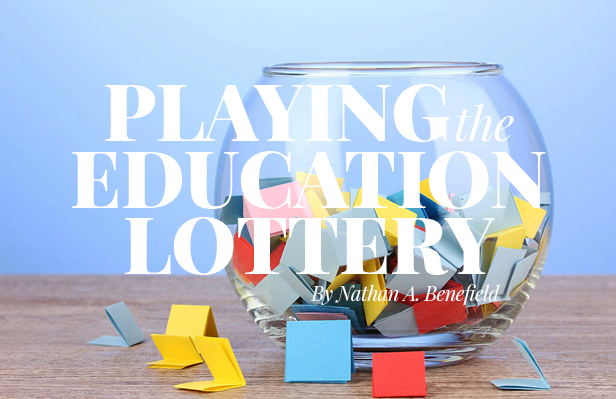Commentary

Playing the Education Lottery
Last month, families from across Pennsylvania waited anxiously to hear if they had finally won the lottery. But these hopeful parents weren’t looking to win the MegaMillions—they were hoping for the chance at enrolling their children in a better and safer school.
In Pittsburgh, families gathered at a local library, waiting for their child’s name to be called. More than 500 children applied for openings at Environmental Charter School, but only 28 spots were available. The school, as required by law, held a lottery to determine the lucky winners and the unfortunate families whose hopes would be denied this year.
The same story took place in greater numbers on the other side of the state. Philadelphia’s Math and Science Technology (MaST) charter school received an incredible 5,000 applications for just 98 slots. The school earned a 90 on the state’s new School Performance Profile, achieving the highest score for a non-magnet school in Philadelphia.
Kevin McCorry of NewsWorks described the scene as students hoped to get their names on the waiting list for enrollment at MaST:
As Anastasia heard her daughter’s name–Nicole Ratkova–called over the speakers, her heart pounded and tears welled in her eyes.
Nicole had been selected for the top spot on the 9th-grade waiting list …
Afterwards, Nicole, who hopes someday to become a lawyer, flushed with excitement.
“I’m actually really happy. I was really nervous at first, but I’m really, really happy,” she said. “If one person comes out, I’ll be in the school.”
Since charter schools were established in Pennsylvania in 1997, enrollments have skyrocketed, demonstrating their popularity among parents who value the ability to choose where to educate their children. In 2013, there were 174 charter schools serving 119,465 students statewide.
Yet despite this growth, another 44,000 students currently are on waiting lists, according to the Pennsylvania Coalition of Public Charter Schools. Why are so many students dependent on a lottery to determine their future?
Currently, charter schools must apply to a local school district for approval to operate. School districts often view charters as unwanted competition—indeed, it’s like requiring McDonald’s to approve any new Wendy’s in the same area. That’s why approval can be a long and difficult process.
The Pittsburgh School District is currently reviewing Environmental Charter’s application to expand, along with applications of other charter schools with a proven record of success (and long waiting lists).
In Philadelphia, the situation has gotten worse. The School District of Philadelphia is demanding that all charter schools agree to caps on enrollment. Effectively, they are trying to set up a wall to keep students trapped in schools they want to leave.
None of the state’s other 499 school districts are legally allowed to impose enrollment caps on charter schools, but Philadelphia’s School Reform Commission has broad exemptions from the law. Some of those exemptions, “jeopardize the very existence of charter schools in Philadelphia,” according to a lawsuit filed last week by a Philadelphia charter school.
By halting charter school growth, the School Reform Commission is effectively limiting the opportunities available for students and denying families the choices they are demanding.
Pending state legislation would help alleviate this logjam by giving universities the ability to authorize new charter schools. In addition, the legislation enhances accountability measures for charter schools and modifies how they are funded.
At least 16 states allow multiple authorizers, including 13 states that empower universities to approve charter schools’ applications. Pennsylvania should follow their lead and open up new avenues for school choice.
By ending the conflict between school districts and charter schools, we would enable more families to select the best school for their children, while allowing successful schools to expand and grow. There’s no reason to limit children’s opportunities for a better education to the random bouncing of a lottery ping pong ball.
# # #
Nathan A. Benefield is vice president of policy analysis for the Commonwealth Foundation (CommonwealthFoundation.org), Pennsylvania’s free market think tank.